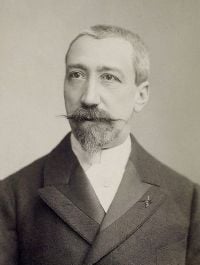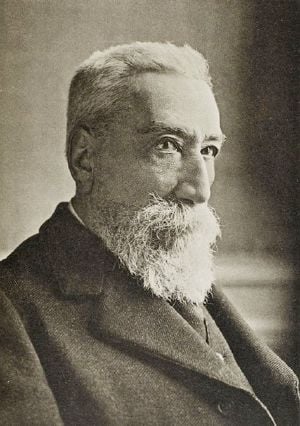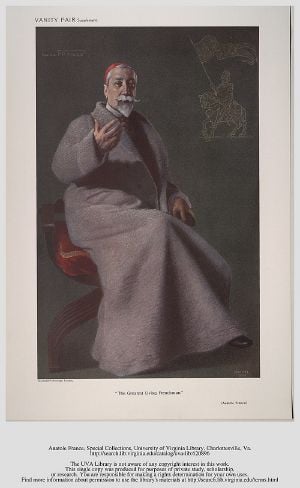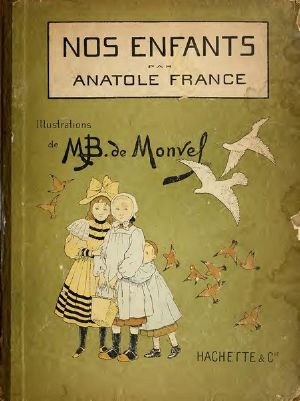Anatole France
| Anatole France | |
|---|---|
 Photograph by Wilhelm Benque | |
| Born | François-Anatole Thibault April 16 1844 Paris, France |
| Died | October 12 1924 (aged 80) Tours, France |
| Occupation | Novelist |
| Signature | |
Anatole France (French pronunciation: [anatɔl fʁɑ̃s]; born François-Anatole Thibault, French pronunciation: [frɑ̃swa anatɔl tibo]; April 16, 1844 – October 12, 1924) was a French poet, journalist, and novelist and author of several best-sellers. Ironic and skeptical, he was considered in his day the ideal French man of letters. He was a member of the Académie Française. In 1921 he was awarded the Nobel Prize for Literature.
France was a socialist who supported liberal causes. He was a signatory of Emile Zola's manifesto in support of Jewish naval officer, Alfred Dreyfus. He also supported the Russian Revolution. He died in 1024.
Early years
The son of a bookseller, France, a bibliophile,[1] spent most of his life around books. His father's bookstore specialized in books and papers on the French Revolution and was frequented by many writers and scholars. France studied at the Collège Stanislas, a private Catholic school, and after graduation he helped his father by working in his bookstore.[2] After several years, he secured the position of cataloguer at Bacheline-Deflorenne and at Lemerre. In 1876, he was appointed librarian for the French Senate.[3]
Personal life
In 1877, France married Valérie Guérin de Sauville, a granddaughter of Jean-Urbain Guérin, a miniaturist who painted Louis XVI.[4] Their daughter Suzanne was born in 1881 (and died in 1918).
France's relations with women were always turbulent, and in 1888 he began a relationship with Madame Arman de Caillavet, who conducted a celebrated literary salon of the Third Republic. The affair lasted until shortly before her death in 1910.[4]
After his divorce, in 1893, France had many liaisons, notably with a Madame Gagey, who committed suicide in 1911.[4]
In 1920, France married for the second time, to Emma Laprévotte.[5] He died in 1924 and is buried in the Neuilly-sur-Seine Old Communal Cemetery near Paris.
France was a socialist and an outspoken supporter of the 1917 Russian Revolution. In 1920, he gave his support to the newly founded French Communist Party.[6] In his book The Red Lily, France famously wrote, "The law, in its majestic equality, forbids rich and poor alike to sleep under bridges, to beg in the streets, and to steal loaves of bread."[7]
Literary career
France began his literary career as a poet and a journalist. In 1869, Le Parnasse contemporain published one of his poems, "La Part de Madeleine". In 1875, he sat on the committee in charge of the third Parnasse contemporain compilation. As a journalist, from 1867, he wrote many articles and notices. He became known with the novel Le Crime de Sylvestre Bonnard (1881).[8] Its protagonist, skeptical old scholar Sylvester Bonnard, embodied France's own personality. The novel was praised for its elegant prose and won him a prize from the Académie Française.[9]
In La Rotisserie de la Reine Pedauque (1893) France ridiculed belief in the occult, and in Les Opinions de Jérôme Coignard (1893), France captured the atmosphere of the fin de siècle. He was elected to the Académie Française in 1896.[10]
France took a part in the Dreyfus affair. He signed Émile Zola's manifesto supporting Alfred Dreyfus, a Jewish army officer who had been falsely convicted of espionage.[11] France wrote about the affair in his 1901 novel Monsieur Bergeret.
France's later works include Penguin Island (L'Île des Pingouins, 1908) which satirizes human nature by depicting the transformation of penguins into humans – after the birds have been baptized by mistake by the almost-blind Abbot Mael. It is a satirical history of France, spanning from Medieval times until the author's own time with special attention to the Dreyfus affair and concluding with a dystopian future.
The Gods Are Athirst
The Gods Are Athirst (Les dieux ont soif, 1912) is a novel, set in Paris during the French Revolution, about a true-believing follower of Maximilien Robespierre and his contribution to the bloody events of the Reign of Terror of 1793–94. The title, Les dieux ont soif, is taken from the last issue of Camille Desmoulins's newspaper, Le Vieux Cordelier, which criticized the Jacobins. Desmouslins had previously been allied with Robespierre, but as the revolution progressed he became fearful of its direction. Desmoulins supposedly took the line from an Aztec explanation of the necessity of human sacrifice.[12]
The novel describes the dark years of the Reign of Terror in Paris, from Year II to Year III. Fiercely Jacobin, Marat and Robespierre's most faithful adherent, a young painter, Évariste Gamelin, becomes a juror on the Revolutionary Tribunal.
The Tribunal's workings drag this idealist into a madness that cuts off the heads of his nearest and dearest, and hastens his own fall as well as that of his idol, Robespierre, in the aftermath of the Thermidorian Reaction. His love affair with the young watercolor-seller Élodie Blaise heightens the terrible contrast between the "butcher-in-training" and the man who shows himself to be quite ordinary in his daily life.
In the midst of the revolutionary turmoil that engulfs Paris, France juxtaposes the liberal use of the guillotine in the fight against the plot to wipe out the gains of the Revolution with the real cost in human suffering. Gamelin is thirsty for justice, but also uses his power to satisfy his own vengeance and his hatred for those who do not think like him. He dies by that same instrument of justice that up until then has served to satisfy his own thirst for blood and terror. It is a wake-up call against political and ideological fanaticism and explores various other philosophical approaches to the events of the time.
The Revolt of the Angels
The Revolt of the Angels (La Revolte des Anges, 1914) is often considered France's most profound and ironic novel. Loosely based on the Christian understanding of the War in Heaven, it tells the story of Arcade, the guardian angel of Maurice d'Esparvieu. Bored because Bishop d'Esparvieu is sinless, Arcade begins reading the bishop's books on theology and becomes an atheist. He moves to Paris, meets a woman, falls in love, and loses his virginity causing his wings to fall off, joins the revolutionary movement of fallen angels, and meets the Devil, who realizes that if he overthrew God, he would become just like God. Arcade realizes that replacing God with another is meaningless unless "in ourselves and in ourselves alone we attack and destroy Ialdabaoth." "Ialdabaoth," according to France, is God's secret name and means "the child who wanders."
Legacy
France won the 1921 Nobel Prize in Literature "in recognition of his brilliant literary achievements, characterized as they are by a nobility of style, a profound human sympathy, grace, and a true Gallic temperament."[13] On May 31, 1922, France's entire works were put on the Index Librorum Prohibitorum ("List of Prohibited Books") of the Catholic Church.[14] He regarded this as a "distinction."[15] This Index was abolished in 1966.
France is also widely believed to be the model for narrator Marcel's literary idol Bergotte in Marcel Proust's In Search of Lost Time.[16]
The English writer George Orwell defended France and declared that his work remained very readable, and that "it is unquestionable that he was attacked partly from political motives."[17]
Works
Poetry
- Les Légions de Varus, poem published in 1867 in the Gazette rimée.
- Poèmes dorés (1873)
- Les Noces corinthiennes (The Bride of Corinth) (1876)
Prose fiction
- Jocaste et le chat maigre (Jocasta and the Famished Cat) (1879)
- Le Crime de Sylvestre Bonnard (The Crime of Sylvestre Bonnard) (1881)
- Les Désirs de Jean Servien (The Aspirations of Jean Servien) (1882)
- Abeille (Honey-Bee) (1883)
- Balthasar (1889)
- Thaïs (1890)
- L'Étui de nacre (Mother of Pearl) (1892)
- La Rôtisserie de la reine Pédauque (At the Sign of the Reine Pédauque) (1892)
- Les Opinions de Jérôme Coignard (The Opinions of Jerome Coignard) (1893)
- Le Lys rouge (The Red Lily) (1894)
- Le Puits de Sainte Claire (The Well of Saint Clare) (1895)
- L'Histoire contemporaine (A Chronicle of Our Own Times)
- 1: L'Orme du mail (The Elm-Tree on the Mall)(1897)
- 2: Le Mannequin d'osier (The Wicker-Work Woman) (1897)
- 3: L'Anneau d'améthyste (The Amethyst Ring) (1899)
- 4: Monsieur Bergeret à Paris (Monsieur Bergeret in Paris) (1901)
- Clio (1900)
- Histoire comique (A Mummer's Tale) (1903)
- Sur la pierre blanche (The White Stone) (1905)
- L'Affaire Crainquebille (1901)
- L'Île des Pingouins (Penguin Island) (1908)
- Les Contes de Jacques Tournebroche (The Merrie Tales of Jacques Tournebroche) (1908)
- Les Sept Femmes de Barbe bleue et autres contes merveilleux (The Seven Wives of Bluebeard and Other Marvelous Tales) (1909)
- Bee The Princess of the Dwarfs (1912)
- Les dieux ont soif (The Gods Are Athirst) (1912)
- La Révolte des anges (The Revolt of the Angels) (1914)
- Marguerite (1920) illustrated by Fernand Siméon
Memoirs
- Le Livre de mon ami (My Friend's Book) (1885)
- Pierre Nozière (1899)
- Le Petit Pierre (Little Pierre) (1918)
- La Vie en fleur (The Bloom of Life) (1922)
Plays
- Au petit bonheur (1898)
- Crainquebille (1903)
- La Comédie de celui qui épousa une femme muette (The Man Who Married A Dumb Wife) (1908)
- Le Mannequin d'osier (The Wicker Woman) (1928)
Historical biography
- Vie de Jeanne d'Arc (The Life of Joan of Arc) (1908)
Literary criticism
- Alfred de Vigny (1869)
- Le Château de Vaux-le-Vicomte (1888)
- Le Génie Latin (The Latin Genius) (1909)
Social criticism
- Le Jardin d'Épicure (The Garden of Epicurus) (1895)
- Opinions sociales (1902)
- Le Parti noir (1904)
- Vers les temps meilleurs (1906)
- Sur la voie glorieuse (1915)
- Trente ans de vie sociale, in four volumes, (1949, 1953, 1964, 1973)
Notes
- ↑ "Anatole France," Benonsensical, July 24, 2010. Retrieved June 24, 2023.
- ↑ David Tylden-Wright, Anatole France (New York, NY: Walker and Company, 1967), 37.
- ↑ Tylden-Wright, 55.
- ↑ 4.0 4.1 4.2 Édouard Leduc, Anatole France avant l'oubli (Paris, FR: Éditions Publibook, 2004, ISBN 978-2748303971), 219, 222-223. Retrieved June 24, 2023.
- ↑ Marie Lahy-Hollebecque, Anatole France et la femme (Paris, FR: Baudinière, 1924).
- ↑ "Anatole France," The Free Dictionary. Retrieved June 24, 2023.
- ↑ Johann J. Go, "Structure, choice, and responsibility," Ethics & Behavior 30(3) (2020): 230–246.
- ↑ “France, Anatole,” Encyclopedia.com Cengage, June 11, 2018. Retrieved June 24, 2023.
- ↑ “Book awards: Prix Montyon de l'Académie française: Book awards by cover,” LibraryThing. Retrieved June 24, 2023.
- ↑ Reino Virtanen, Anatole France (New York, NY: Twayne Publishers, Inc., 1968), 88.
- ↑ Jonka Tekijä, “Anatole France (1844-1924)- pseudonym for Jacques Anatole Francois Thibault.” Authors’ Calendar: books and writers. Retrieved June 24, 2023.
- ↑ Thomas Carlyle, The French revolution: a history in three parts (Part III: The Guillotine) (Legare Street Press, 2022 (original 1837), ISBN 978-1019261149), 173.
- ↑ Anatole France: The Nobel Prize in Literature 1921 The Nobel Prize. Retrieved June 24, 2023.
- ↑ Paul Halsall, "Modern History Sourcebook: Index librorum prohibitorum: 1557–1966 (Index of Prohibited Books)," Internet History Sourcebooks Project, Fordham University, May 1998. Retrieved June 23, 2023.
- ↑ Current Opinion: Volume 73 (Chicago, IL: Open Court Publishing, 1922), 295.
- ↑ Charles Matthews, "Marcel Proust: A Life, by Edmund White" Ten Pages More, July 12, 2010. Retrieved June 23, 2023.
- ↑ Bernard Harrison, What Is Fiction For? Literary Humanism Restored (Bloomington, IN: Indiana University Press, 2014, ISBN 978-0253014122). Retrieved June 23, 2023.
ReferencesISBN links support NWE through referral fees
- Carlyle, Thomas. The French Revolution: A history. Legare Street Press, 2022 (original 1837), ISBN 978-1019261149
- Current Opinion: Volume 73. Chicago, IL: Open Court Publishing, September 1922.
- Go, Johann J., "Structure, choice, and responsibility," Ethics & Behavior 30(3) (2020): 230–246.
- Halsall, Paul. "Modern History Sourcebook: Index librorum prohibitorum: 1557–1966 (Index of Prohibited Books)," Internet History Sourcebooks Project, Fordham University, May 1998. Retrieved June 23, 2023.
- Harrison, Bernard. What Is Fiction For?: Literary Humanism Restored. Bloomington, IN: Indiana University Press, 2014. ISBN 978-0253014122
- Lahy-Hollebecque, Marie. Anatole France et la femme. Paris, FR: Baudinière, 1924.
- Leduc, Édouard. Anatole France avant l'oubli. Paris, FR: Éditions Publibook, 2004. ISBN 978-2748303971
- Matthews, Charles. "Marcel Proust: A Life, by Edmund White" Ten Pages More, July 12, 2010. Retrieved June 23, 2023.
- Tekijä, Jonka. “Anatole France (1844-1924)- pseudonym for Jacques Anatole Francois Thibault.” Authors’ Calendar: books and writers. Retrieved June 24, 2023.
- Tylden-Wright, David. Anatole France. New York, NY: Walker and Company. 1967.
- Virtanen, Reino. Anatole France. New York, NY, Twayne Publishers, Inc., 1968.
External links
All links retrieved June 25, 2023.
- A collection of eBooks at Standard Ebooks
- Nobel Prize for Literature 1921: Anatole France Bibliothèque Nobel
- Anatole France (1844 - 1924) Librivox
- "Anatole France, Nobel Prize Winner" by Herbert S. Gorman, The New York Times, November 20. 1921
- Anatole France Collection Syracuse University
- Anatole France Find a Grave
|
1901: Sully Prudhomme | 1902: Theodor Mommsen | 1903: Bjørnstjerne Bjørnson | 1904: Frédéric Mistral, José Echegaray | 1905: Henryk Sienkiewicz | 1906: Giosuè Carducci | 1907: Rudyard Kipling | 1908: Rudolf Christoph Eucken | 1909: Selma Lagerlöf | 1910: Paul Johann Ludwig von Heyse | 1911: Maurice Maeterlinck | 1912: Gerhart Hauptmann | 1913: Rabindranath Tagore | 1915: Romain Rolland | 1916: Verner von Heidenstam | 1917: Karl Adolph Gjellerup, Henrik Pontoppidan | 1919: Carl Spitteler | 1920: Knut Hamsun | 1921: Anatole France | 1922: Jacinto Benavente | 1923: William Butler Yeats | 1924: Władysław Reymont | 1925: George Bernard Shaw |
Credits
New World Encyclopedia writers and editors rewrote and completed the Wikipedia article in accordance with New World Encyclopedia standards. This article abides by terms of the Creative Commons CC-by-sa 3.0 License (CC-by-sa), which may be used and disseminated with proper attribution. Credit is due under the terms of this license that can reference both the New World Encyclopedia contributors and the selfless volunteer contributors of the Wikimedia Foundation. To cite this article click here for a list of acceptable citing formats.The history of earlier contributions by wikipedians is accessible to researchers here:
The history of this article since it was imported to New World Encyclopedia:
Note: Some restrictions may apply to use of individual images which are separately licensed.



